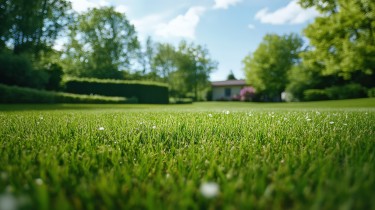

Discover the Secret to a Lush and Healthy Lawn
Read More ›
Blog
Keep insects, weeds and disease from destroying your yard…

Most homeowners want their lawns to be thick, lush and green… but nature isn’t concerned with how your lawn looks, and many people find themselves in an endless battle against weeds, disease and other garden pests.
You can see exactly what we mean with these before photos. The after photos are what happens after a lawn repair program with Brandon Rushing.






Below are the most common lawn issues we have here in Virginia and what you can do about them!
There are a number of issues that can leave bare patches on your lawn — insects, disease, heavy foot traffic, pets, pulling weeds — so the first thing you need to do is determine what’s causing them and resolve the situation.
Once resolved, simply sod or reseed the area. The best time to do this (especially if you’re talking about a large area) is in the early fall when cool-season grasses are actively growing, giving the new grass a chance to take root before going dormant in the winter.
If reseeding, don’t just throw seeds on the ground. Add a thin layer of enriched soil and gently rake the seeds in. Water thoroughly until the new grass is established.
If the area is extremely large it might be best to renovate the lawn entirely with slit seeding followed by a compost top dressing to help fill in the bare areas properly.

Crabgrass, nutsedge and other broadleaf weeds start to germinate when the evening soil temperatures are consistently over 56 degrees — usually from June to August. We eliminate these weeds as part of our standard Lawn Care program using a pre-emergent herbicide.
To do it yourself, you’d have to apply a herbicide too — unless your idea of summer fun is spending hours on your knees pulling weeds! Just make sure to follow the directions carefully so you don’t damage your lawn or accidentally kill desirable plants in adjacent gardens.
Broadleaf weeds are easy to control when compared to the grassy weeds found in lawns throughout Virginia. These weeds are actually warm-season grasses that are invasive and aggressive, making them difficult to control.
The most common varieties are Bermudagrass, nimblewill, Japanese stiltgrass and bentgrass. If left unchecked, these grasses will completely take over your lawn and gardens in under five years!
The best way too control these invasive grasses yourself (without spending hours digging it out by the roots) is to apply a selective herbicide when these grasses are actively growing (July and August).
If you’re not crazy about using a herbicide yourself, we have a Bermudagrass suppression program (not part of our standard program) that will control most grassy weeds. Our trained applicators will apply three aggressive treatments spread over July and August.
Because it’s so aggressive, this treatment has to be completed every year (ask us about this service if grassy weeds are a problem for you).

If rodents and birds are digging up your yard, and your turf feels spongy when you step on it, it’s more than likely you have a grub infestation.
The best time to apply an insecticide is when the grubs are in the larval stage, usually mid-June to early July. Look for one with the chemicals carbaryl and trichlorfon. They’re short-lived compounds that kill all life stages of grubs.
To be effective, insecticides must be applied before mid-August, before damage has occurred.
We apply insecticidal treatment as part of our regular lawn care service to take care of grubs and other turf-destroying insects.

Virginia tends to have hot, humid summers, making lawn diseases like brown patch, dollar spot and grey leaf spot quite common in our area.
If your lush healthy lawn suddenly develops yellow or brown spots — and no amount of water can bring it back to life — it’s probably suffering from one of these fungal diseases.
While you can treat small patches of fungus with an organic treatment (such as neem oil), applying a fungicide is far more effective to cover large areas.
To help homeowners deal with this problem, we’ve formulated an effective, five-treatment program to keep these diseases from damaging your lawn over the summer (this treatment is an add-on program).

I can’t stress enough how important regular lawn care is when it comes to preventing these common issues — keeping your lawn thick and healthy really is its best defense.
Want help keeping your lawn thick, green and healthy?
If caring for turfgrass was easy, everyone would have a great lawn! The truth is, it takes a fair amount of time, effort, knowledge and plain hard work to have a lawn that is thick, lush and healthy.
We understand that not everyone has the time (or desire) to spend their summers caring for their lawn… they’d rather spend that time enjoying it!
The team at Brandon Rushing is happy to help — our lawn care programs can help prevent and control these common lawn issues. If you’re interested in these services, book a consultation!
Written by Brandon Rushing, Founder & President
Posted on: June 14th, 2022